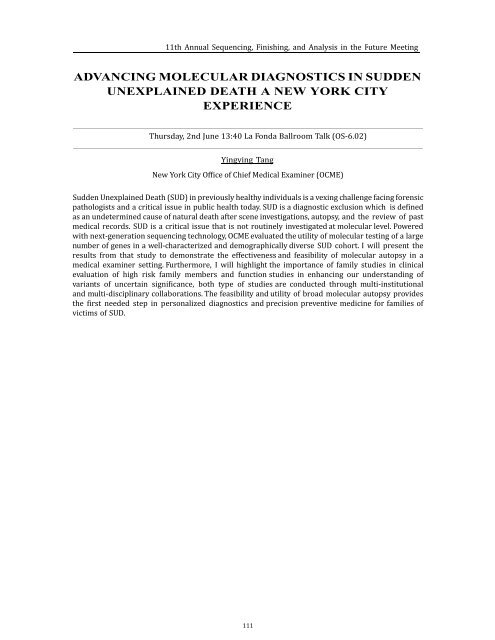Sequencing
SFAF2016%20Meeting%20Guide%20Final%203
SFAF2016%20Meeting%20Guide%20Final%203
Create successful ePaper yourself
Turn your PDF publications into a flip-book with our unique Google optimized e-Paper software.
11th Annual <strong>Sequencing</strong>, Finishing, and Analysis in the Future Meeting<br />
ADVANCING MOLECULAR DIAGNOSTICS IN SUDDEN<br />
UNEXPLAINED DEATH A NEW YORK CITY<br />
EXPERIENCE<br />
Thursday, 2nd June 13:40 La Fonda Ballroom Talk (OS‐6.02)<br />
Yingying Tang<br />
New York City Office of Chief Medical Examiner (OCME)<br />
Sudden Unexplained Death (SUD) in previously healthy individuals is a vexing challenge facing forensic<br />
pathologists and a critical issue in public health today. SUD is a diagnostic exclusion which is defined<br />
as an undetermined cause of natural death after scene investigations, autopsy, and the review of past<br />
medical records. SUD is a critical issue that is not routinely investigated at molecular level. Powered<br />
with next‐generation sequencing technology, OCME evaluated the utility of molecular testing of a large<br />
number of genes in a well‐characterized and demographically diverse SUD cohort. I will present the<br />
results from that study to demonstrate the effectiveness and feasibility of molecular autopsy in a<br />
medical examiner setting. Furthermore, I will highlight the importance of family studies in clinical<br />
evaluation of high risk family members and function studies in enhancing our understanding of<br />
variants of uncertain significance, both type of studies are conducted through multi‐institutional<br />
and multi‐disciplinary collaborations. The feasibility and utility of broad molecular autopsy provides<br />
the first needed step in personalized diagnostics and precision preventive medicine for families of<br />
victims of SUD.<br />
111


